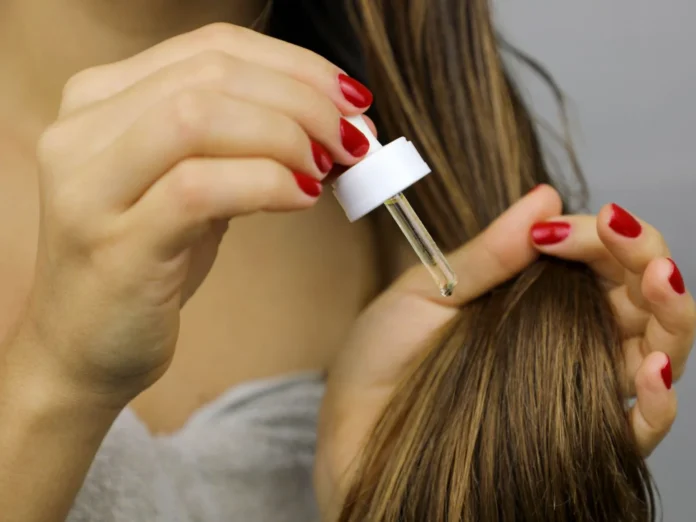We know that applying glycerine to the skin can have numerous benefits, but did you know it can also be beneficial for your hair? If this surprises you, you’re not alone. We have all the answers to your questions here.
“Applying glycerine to your scalp can be beneficial, especially if you have dry, flaky, or itchy skin,” said Dr. Rinky Kapoor, consultant dermatologist, cosmetic dermatologist, and dermato-surgeon at The Esthetic Clinic. Glycerine is a humectant, which means it attracts moisture from the environment and helps retain it in your skin.
The benefits of glycerine extend to the hair and scalp due to its hydrating properties. By drawing moisture into the scalp, glycerine helps to combat dryness and flakiness, which can be particularly problematic for those with dandruff or an itchy scalp. This moisture retention not only soothes the scalp but also promotes a healthier environment for hair growth.
Dr. Kapoor noted that glycerine’s ability to lock in moisture can also help reduce frizz and improve the overall texture of your hair. “When your scalp and hair are well-hydrated, your hair tends to be smoother and more manageable,” she explained. This makes glycerine a great addition to your hair care routine, especially if you struggle with dry or brittle hair.
Applying glycerine to the scalp is simple. Dr. Kapoor suggests mixing glycerine with water or your regular hair oil to make it easier to apply. Gently massage the mixture into your scalp and let it sit for about 15-20 minutes before rinsing it off with a mild shampoo. This treatment can be done once or twice a week, depending on the severity of your scalp condition.
While glycerine is generally safe for most people, Dr. Kapoor advises conducting a patch test before using it extensively on your scalp. “Apply a small amount of diluted glycerine to a patch of skin and wait 24 hours to check for any adverse reactions,” she recommended. This step ensures that you do not have an allergic reaction or irritation from the product.
Glycerine’s versatility in hair care goes beyond just hydrating the scalp. Its emollient properties can also help repair and strengthen the hair shaft. “By creating a protective layer on the hair strands, glycerine can reduce breakage and split ends,” explained Dr. Kapoor. This protective barrier helps maintain the integrity of the hair, making it resilient to environmental stressors such as pollution, heat, and styling products.
For individuals with curly or textured hair, glycerine can be particularly beneficial. Curly hair types are naturally prone to dryness because the natural oils from the scalp have a harder time traveling down the hair shaft. Incorporating glycerine into a hair care regimen can help maintain moisture levels and enhance curl definition. Dr. Kapoor suggested using a glycerine-based leave-in conditioner to keep curls hydrated and bouncy throughout the day.
Another advantage of glycerine is its mild and non-toxic nature, making it suitable for sensitive scalps. Unlike some commercial hair products that contain harsh chemicals and fragrances, glycerine is a natural ingredient that is unlikely to cause irritation. This makes it an excellent choice for those with sensitive skin or allergies. “Glycerine is gentle and can be used by individuals with sensitive scalps without worrying about adverse effects,” Dr. Kapoor emphasized.
While glycerine is beneficial, it is crucial to use it correctly to avoid potential drawbacks. Overuse or improper dilution can lead to a sticky residue that attracts dirt and pollutants, counteracting its benefits. Dr. Kapoor recommended always diluting glycerine with water or mixing it with other hair-friendly ingredients like aloe vera or essential oils. “A balanced approach ensures that you reap the benefits of glycerine without any negative side effects,” she advised.
In addition to regular application, integrating glycerine into DIY hair masks can enhance its benefits. For instance, a mask combining glycerine, honey, and coconut oil can provide deep conditioning and intense hydration. Honey acts as an additional humectant, while coconut oil nourishes and strengthens the hair. Applying such a mask once a week can revitalize dry and damaged hair, giving it a healthy shine.
While glycerine is effective, it is also essential to consider other aspects of hair care for optimal results. Maintaining a balanced diet rich in vitamins and minerals supports hair health from within. Staying hydrated by drinking plenty of water is equally important, as internal hydration reflects on the skin and hair. “A holistic approach to hair care, combining external treatments like glycerine with a healthy lifestyle, yields the best results,” Dr. Kapoor noted.

